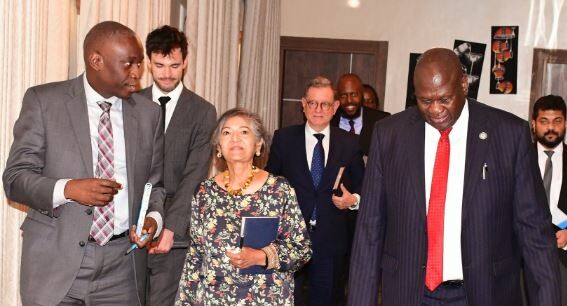The Commission on Human Rights in South Sudan on Friday said that as the country’s transition nears completion, the risk of further mass violence and accompanying gross human rights violations remains ever-present.
According to their latest report which covers the period January to December 2023 and which was presented to the United Nations Human Rights Council on Friday morning in Geneva, the Commission says patterns of violence, violations, and impunity continue.
The report also identifies opportunities and challenges, as well as early warnings. It draws upon the investigations in 2023 undertaken by the Commission, which conducted eight missions within South Sudan and additional missions outside the country. It collected 105 witness statements, conducted 253 meetings, and gathered confidential records and evidence.
The report contains nine substantive sections, examining: political, security, and legal developments; subnational conflict; sexual and gender-based violence; abductions of women and children; rights of children; South Sudanese refugees and displacement; accountability and transitional justice; political economy; and civic and political space.
The key findings presented in the report include: The processes under the Revitalized Agreement provide for sustainable peace and human rights protections, yet its essential obligations remain outstanding or incomplete. These include the adoption of a permanent constitution, the unification of armed forces, and the establishment of transitional justice institutions.
“Even as insurgency persists, subnational conflict and violence instigated by political and military elites is devastating. The violence is characterized by serious violations and abuses, including attacks on settlements. Abductions are a troubling exploitative enterprise; victims must be released, and perpetrators punished,” the report observes. “South Sudan cannot prosper or be truly free unless widespread violence against women and girls ends. This requires urgent societal changes, political commitment at all levels, and accountability. South Sudanese children are routinely denied access to health and education entitlements, going hungry, stunting their development and damaging their childhoods, with adverse impacts on the country’s future.”
“Political failures to implement transitional justice measures, ensure an independent and effective justice system, or deal with the root causes and drivers of conflict, violations and crimes, compound impunity,” it added.
According to the Commission, members of security forces who perpetrate crimes must be suspended, prosecuted, and expelled from forces.
The Commission also said that constitution-making and electoral processes provide new opportunities for visionary leadership, yet these require open democratic space to enable credible outcomes and avoid generating further grievances.
“Curtailment of civic and political space continues. Measures to ensure the freedom, fairness, and security of democratic processes are critical and urgent. If not, new grievances, conflict, and violations may emerge,” the report warned. “Long-term stability and prosperity requires addressing the drivers and structural causes of violence. Sustainable peace and human rights protection in South Sudan will remain elusive unless the Revitalized Agreement is implemented, and the state abides by its international human rights law obligations.”
The Commission recommended that the Government of South Sudan urgently implement core aspects of the 2018 Revitalized Peace Agreement; address impunity, including by dismissing or suspending officials complicit in serious crimes; ensure there are no blanket amnesties for serious crimes under international law and allocate sufficient resources to enable functioning rule of law institutions.
It also urged the government to prioritize the protection of women and girls, and the rights of children; respect and protect civil and political rights, including by ending attacks and arbitrary restrictions on the media and civil society, and amending the National Security Services Act in line with the State’s obligations under the International Covenant on Civil and Political Rights.
“The government should address subnational conflict and related violations, including by ceasing the instigation of violence and defections,” The Commission advised.
The Commission suggested that the African Union and IGAD unlock the stalemate with the Government of South Sudan on establishing the Hybrid Court, and develop early warning systems to address heightened risks of violence during and after electoral processes.
The Commission counseled UN Member States to assist the Government of South Sudan in taking measures to end violence, especially conflict-related sexual violence; encourage authorities to ensure civic space; and decrease facilitating violations, including extraordinary renditions.
It also tasked the UN system to provide opportune protection and humanitarian assistance to civilians and continue critical support including for rule of law and justice institutions in South Sudan.




